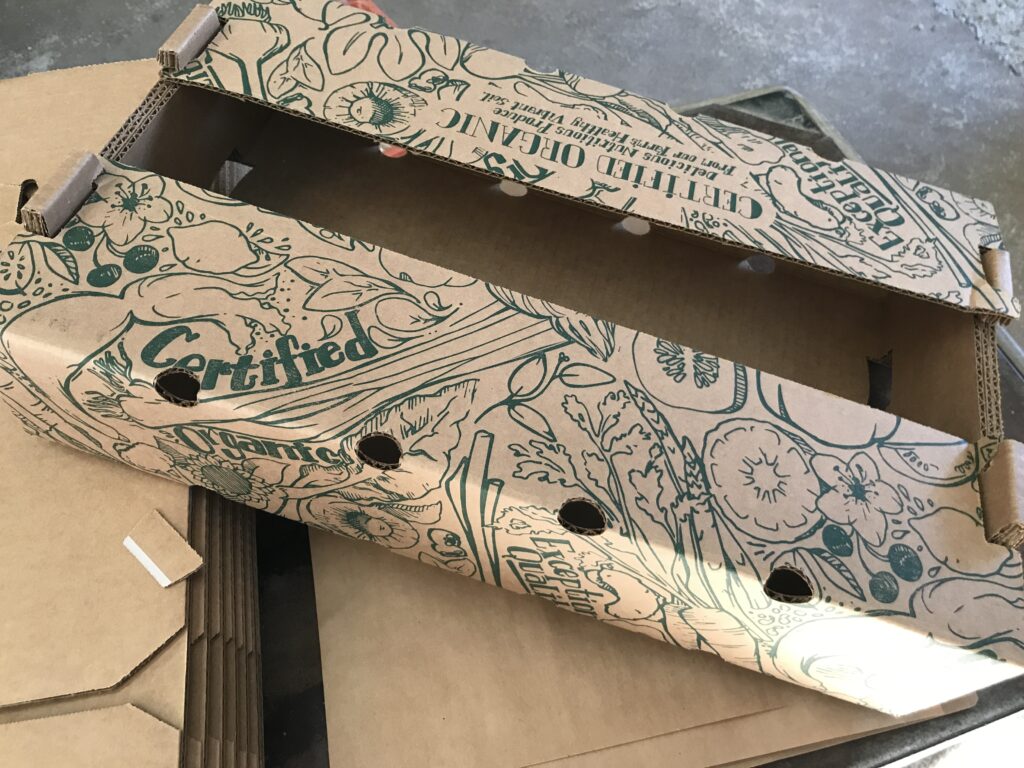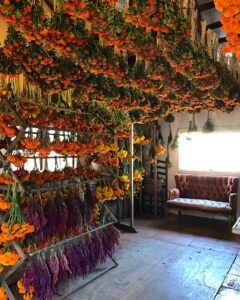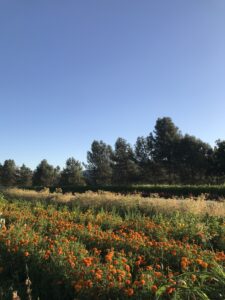
Last week’s deep dive into our plastic CSA boxes and wax boxes (which you can read, or reread, here) got pretty detailed, but I realized during the rest of the week that we’d barely scratched the surface when it comes to boxes and packaging. The Beet could probably focus on some aspect of packaging and post-harvest handling every week! But that would get boring pretty quickly.
One thing that isn’t boring is the box making machine, which we use to make the 4-inch boxes that we use for flats of heirloom tomatoes, peaches, pints of cherry tomatoes, shishitos, figs etc. and so much more in the summer. Check out the video of it in action:
We don’t own the machine but have rented it for the past few years (Maybe five? No one can remember for sure) and we’ll end up making and using around 35,000 of these boxes. We used to make all of these these by hand! A fast person can make about 40 boxes an hour and by comparison, the machine makes 800-1,000 boxes per hour. While it can be finicky to set up, once we have it calibrated, it quickly proves its worth. It moves much faster, and the boxes are stronger, because of glue, which isn’t on the ones that we fold by hand.
Those are just the 4-inch boxes. There are so many other types (bigger, smaller, just for melons, just for flowers), and we also make all these by hand.
Based on a few inquiries from CSA members, I do want to share a note about packaging material inside the CSA boxes. We aim to keep it minimal and avoid waste, but we do use a lot of bags and rubber bands to protect your produce. We can take back the plastic pint baskets and the netted mesh bags that some folks get potatoes in. We cannot not take back rubber bands, twist ties, or paper bags, waxed or otherwise. The waxed paper bags are compostable (in a city compost, not necessarily in a home pile) according to the manufacturer. Each composting company can make their own rules though, so you may want to confirm with your specific company. Cardboard boxes for home deliveries and special orders can be returned if they are clean, dry, and in good condition. If you get a special order item that comes in a freezer bag with an ice pack, please leave the freezer bag and ice at the CSA site.
A few more CSA notes:
- It is always my goal to get as specific as possible about what you’re getting in your box. During some times of the year, this is easy, but not so during the summer. We grow many types of cucumbers, melons, eggplants, peppers, and tomatoes and when we pack the boxes, many different types may be used and plans about specific varieties can switch during the day. As a result, the newsletter can be vague about what you’re getting, or if it is specific, it might be wrong due to a last minute change (it’s already happened a few times this year with melons). Our website is a great tool to identify your produce. We have a page for each produce item which you can access via links in the Beet newsletter, or on our website on the What We Grow, What’s in My Box, and Recipes pages. If you have additional questions about what’s in your box, you can always send us an email! A picture is often helpful.
- Want to add any items with your box? Or are you going to be away and need to skip or donate a box? The website is the best place do all of these things. You have until two full days before your delivery date (i.e. Sunday night for a Wednesday pickup, Tuesday night for a Friday pickup). If you miss the deadline, you can email the next day. We are not able to make changes the day before your delivery.
- Got a friend or neighbor who is CSA-curious? We welcome any and all produce lovers and they can join via our website whenever they’d like. We did create a waiting list in the early days of the pandemic, but that list is long gone.
- We believe that everyone should have access to high-quality produce but understand that the cost of our CSA is not accessible to everyone. When a CSA member donates their box, the value of that box goes into our Good Food Community Fund. This Fund provides weekly boxes to the Charlotte Maxwell Clinic and is used to provide subsidized boxes for others. The CSA subsidy is available on a short-term or long-term basis, provided that funds are available. If you, or someone you know is interested in our subsidized box program, please email us to inquire.
Do you have other questions about things in your boxes or happenings at the farm? Let us know! We also always welcome feedback as well as favorite recipes, or storage and processing tips to share in the Beet.
– Elaine Swiedler, CSA Manager



Photo credits: Elaine Swiedler, Hannah Muller, Tim Kontje
